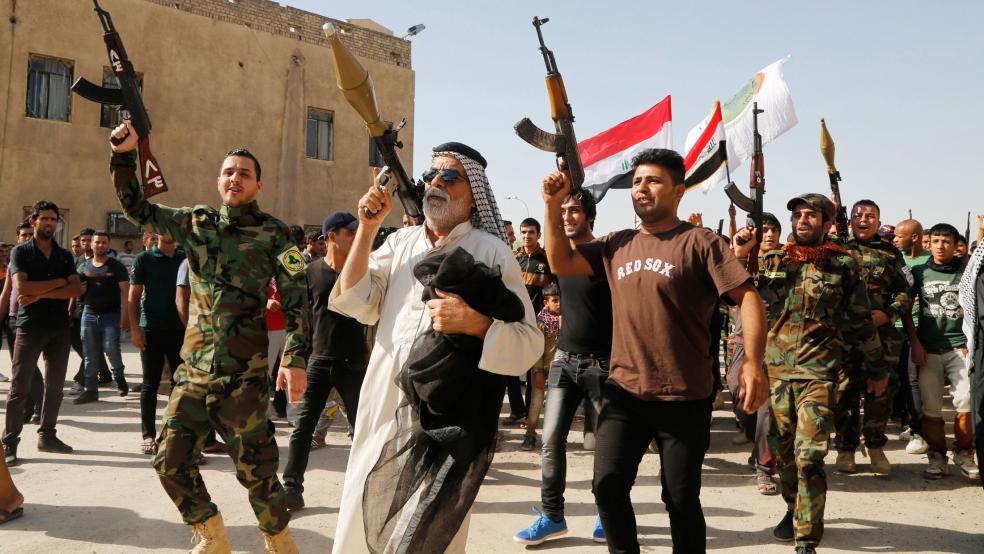What does a terrorist network with nearly $430 million worth of stolen moneybags filled with cash and gold bullion do?
That’s the question on the minds of security experts after a mere 800 fighters from the Islamic State of Iraq and Syria (ISIS) overpowered nearly 30,000 U.S.-trained Iraqi troops in Mosul. While robbing Mosul’s central bank and a number of others in the region, the Sunni militant group also managed to steal U.S.-made vehicles, arms, and ammunition--which arguably present a much more powerful international message than their stunning amount of cash now on hand.
Related: The Need for U.S. Special Forces in Iraq
More than a week after the siege in Mosul, the ISIS fighters claim sway over a giant swatch of land stretching from Aleppo to Fallujah, and promise to march on to the Iraqi capital of Baghdad.
On Sunday, ISIS took to Twitter, claiming to have massacred 1,700 Iraqi Shia air force recruits in Tikrit (former President Saddam Hussein’s hometown). The State Department, in a statement, said that “one of the primary goals of ISIL (Islamic State of Iraq and the Levant) is to set fear into the hearts of all Iraqis and drive sectarian division among its people.” The statement went on the promise that the U.S. will “do its part to help Iraq move beyond this crisis.”
But just what the U.S. administration is prepared to do remains an open – and hotly debated – question. As he weighs his options, President Obama has ruled out U.S. boots on the ground inside Iraq but still is considering a return, at least temporarily, to some form of combat posture even though his rise to national political prominence was defined by his promise to end U.S. military involvement in the country where what he calls George W. Bush’s misguided war of choice cost the lives of 4,487 U.S. military personnel and over $1 trillion.
Related: Market Volatility Likely with Focus on Fed and Iraq
The ISIS march is again raising profound questions about the training and readiness of Iraqi troops, despite a 2012 inspector general report that claimed roughly $25 billion was spent on "training, equipping and sustaining" the Iraqi security forces. The New York Times reported that Iraq has also put billions of its own money into its security forces, purchasing weapons ranging from Apache helicopter gunships, to F-16 fighter jets, to Hellfire missiles.
Nonetheless, Iraq’s army appears utterly unprepared – or unwilling - to defend itself, despite the fact it greatly outnumbers ISIS’ estimated 3,000 to 5,000 fighters.
As the President weighs his options, a new Iraq debate is raging in Washington.
Related: Obama Warns of ‘Wake Up Call for Iraq’
Appearing on CNN’s State of the Union Republican Senator Lindsey Graham called Obama a “delusional, detached president.” He went on to say, "The stubborn-headed president we have, who thinks he knows better than everybody else, who withdrew troops and exposed this country to the inevitable, needs to change his policies quickly.”
It is ISIS’ stated mission that has the White House so worried, and the president’s critics demanding he weigh more muscular responses.
Jessica Lewis, an ISIS expert at the Institute for the Study of War, told Time, “Sectarian civil war is the enabler…They want to set conditions in Iraq that look like Syria so they can set up an Islamic state.”
Since January, Iraqi security forces have been battling ISIS in the western Anbar province’s two biggest cities--Fallujah and Ramadi. All the while, Nouri al-Maliki, Iraq’s Prime Minister, has been publically accusing both Saudi Arabia and Qatar of funneling money towards ISIS.
Related: Could Hillary Clinton Have Prevented the Crisis in Iraq?
"I accuse them of inciting and encouraging the terrorist movements,” al-Maliki told France 24. “I accuse them of supporting them politically and in the media, of supporting them with money and by buying weapons for them.”
In the past, the ISIS has managed to pay for its fighters and weapons through private donors, reportedly having money funneled through the likes of Kuwait, Saudi Arabia, and Qatar. But as they took control over more land, they began acting as somewhat of a de-facto state, levying taxes and customs duties—all the while, taking advantage of weak money laundering protections.
More money started flowing in as they got their hands in the oil industry. They’ve managed to find business in the extraction and sale of oil in towns like Syria's Deir al-Zur Province, and most recently, in Iraq’s northern city of Baiji.
According to recent reporting by The Fiscal Time’s David Francis, a major reason why the financing of terrorist networks is difficult to stop is because many of their transactions happen informally, and in cash. Francis was told by members of al-Shabab, the Somali al-Qaeda affiliate, that they finance operations with friendly banks, such as those owned by Somalis. They also receive money from international supporters—mainly from Saudi Arabia—all the while bribing politicians to allow them to do business under the table.
Related: How the Collapse of Iraq Would Affect America
Because of the reported $430 million take from the Mosul bank, the financing of al-Shabab now could pale in comparison to ISIS. According to Money Jihad, as of 2011, the Taliban was estimated to have between $70 to $400 million; Hezbollah, between $200 million to $500 million; Farc, between $80 million to $350 million; and Hamas, an estimated $70 million.
Iraqi governor, Atheel al-Nujaifi, told NBC News that the heist makes ISIS the “world’s richest terrorist group.” It’s a big leap from the mere $30 million budget that the CIA estimated al-Qaeda had on 9/11.
It begs the question: what will--and what can--ISIS spend the money on?
Top Reads from The Fiscal Times:





